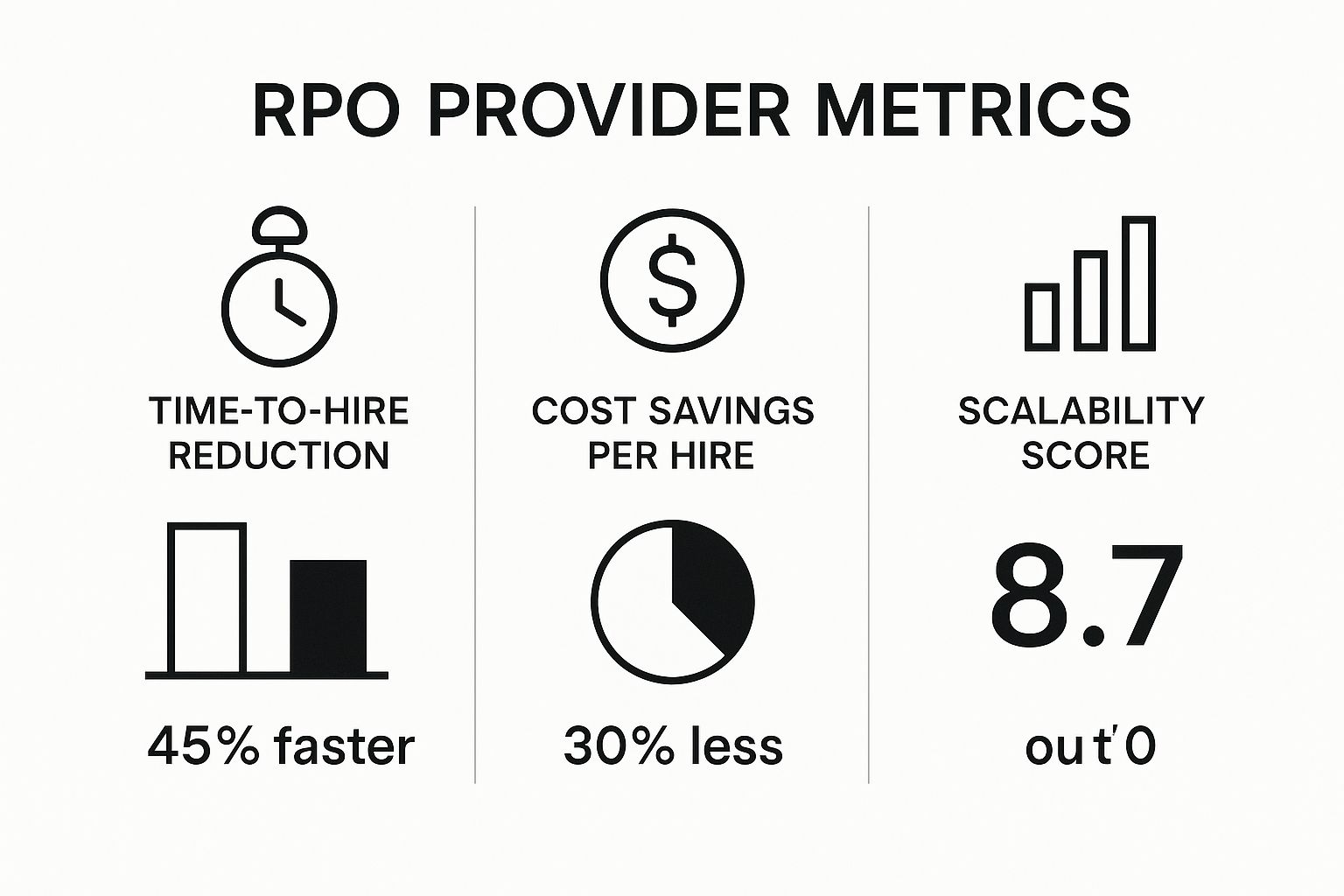Think of a recruitment process outsourcing provider as a true partner, not just another vendor. They become an extension of your own company, taking the entire hiring process off your plate. This is a deep, strategic relationship—they don't just fill jobs; they bring in specialized know-how, better tech, and scalable systems to fundamentally improve how you hire.
Unlike a temp agency that just finds a person for a role, an RPO partner integrates into your business. They manage the whole shebang, from sourcing candidates all the way to onboarding them, all while making sure your hiring strategy actually supports your bigger business goals.
What Exactly Are Recruitment Process Outsourcing Providers?
Let’s get one thing straight: an RPO provider isn’t just a group of external recruiters. It’s more like you’ve instantly hired a fully-formed, expert talent acquisition department. Imagine you hired a top-tier marketing agency to run your campaigns—an RPO does the exact same thing, but for finding and hiring people.
They don't just reactively fill open positions. They build, manage, and fine-tune the entire engine that brings talent into your organization. They take full responsibility for the process, start to finish, handling all the complex parts of hiring that internal HR teams often don't have the time or resources to perfect.
More Than Just Recruiters
It's a common mistake to lump RPO providers in with traditional staffing agencies. They both find people, sure, but how they do it couldn't be more different. A staffing agency is transactional; you have an open seat, they find someone to fill it, and you pay a fee. It’s a short-term fix.
An RPO provider, on the other hand, plays the long game. They're strategic. They’re not just plugging holes; they’re proactively building a pipeline of great talent that fits your company's culture and future needs. They get to know your brand, your values, and your vision.
The real difference comes down to ownership. A staffing agency finds you a candidate. An RPO provider becomes your recruiting department, owning the process, the technology, and the results as if they were sitting down the hall from you.
The Core Functions of an RPO Partnership
So, what does this actually look like day-to-day? A good RPO partner seamlessly handles a whole host of activities, making the entire experience feel like it’s being run by your own internal team.
Here's a look at what they typically take on:
- Process Design and Optimization: First, they'll audit your current hiring process. Then, they’ll rebuild it from the ground up to be faster, more efficient, and better at finding the right people.
- Candidate Sourcing and Screening: They use their powerful tools and massive networks to find and attract top talent—not just people who are actively looking, but also the passive candidates you’d never find otherwise.
- Interview Coordination and Management: They take care of all the scheduling headaches. This ensures a smooth, professional experience for your candidates and frees up your hiring managers' time.
- Employer Brand Enhancement: A great RPO partner actively works to make your company look like an amazing place to work. They help you tell your story and attract the best of the best.
- Technology and Analytics: They bring their own tech stack to the table, including advanced Applicant Tracking Systems (ATS) and analytics tools. This gives you hard data to make smarter hiring decisions.
When you hand these critical functions over to a specialist, your team is free to focus on what they do best—running the business—knowing your talent pipeline is in expert hands.
The Strategic Impact of Partnering with an RPO Provider

Bringing in recruitment process outsourcing providers isn't just about handing off tasks; it's a strategic move that can fundamentally change how your business grows. The right RPO partnership goes far beyond filling empty seats. It delivers real, measurable value that turns your talent acquisition function from a cost center into a serious competitive advantage.
This impact ripples out well beyond the HR department. By getting smarter about who you hire and how you hire them, an RPO partnership directly boosts your company's bottom line, innovation, and ability to react to market changes. Let's break down the four key areas where you'll see the biggest difference.
Achieve Significant Cost Efficiencies
One of the first things you'll notice with an RPO partnership is a sharp drop in your hiring costs. When an expert takes over the entire recruitment lifecycle, you sidestep a lot of the hidden expenses that come with doing it all in-house. Think about the high fees for job board ads, the costly one-off agency placements, and the sheer administrative weight on your internal team.
The Recruitment Process Outsourcing Association estimates that RPO programs can slash the cost-per-hire by more than 20%. This isn't just about saving cash; it’s about freeing up those funds to invest back into your core business operations.
For example, imagine a fast-growing retail chain that needs to staff several new stores at once. An RPO can manage that entire high-volume project, saving the company from the enormous cost of building a temporary internal team. The result is predictable spending and a much healthier budget.
Elevate the Quality of Hires
Let's be honest: top-tier talent rarely stumbles across a job board. This is where RPO providers really shine. They are masters of proactive sourcing, using their deep networks and smart tech to find passive candidates—those skilled professionals who aren't looking for a job but are open to a great opportunity. This immediately opens up a much wider, higher-quality talent pool.
An RPO partner shifts your hiring from reactive to proactive. Instead of waiting for the right person to apply, they go out and find the best person for the role, significantly improving the caliber of talent that walks through your door.
This approach is critical for filling specialized roles. Picture a healthcare system trying to hire a team of highly specialized nurses. An RPO with deep roots in the healthcare industry can tap into niche professional communities that a generalist HR team would never find, ensuring you get better-qualified hires every single time.
Gain Unmatched Scalability and Flexibility
Business needs are always in flux. One quarter you might need to hire 100 salespeople, and the next, just a handful of engineers. RPO providers are designed for this exact scenario. They let you scale your recruiting power up or down on demand, without the headache and expense of hiring or laying off your own recruiters.
This kind of agility is a game-changer for project-based companies or businesses expanding into new markets. A tech startup that just landed a big funding round can lean on an RPO to build out its development team in record time, hitting critical product deadlines that would be impossible to meet on its own.
Deliver Strategic Workforce Insights
Today’s recruitment process outsourcing providers are data powerhouses. They track everything from which hiring sources deliver the best candidates to where people are dropping off in the interview process. They then turn that raw data into powerful insights you can actually use to make smarter decisions about your entire workforce strategy.
This data-first approach is becoming a must-have. The global RPO market was valued at around $7 billion in 2024 and is expected to grow to $8.14 billion by 2025. This growth is a clear signal that businesses are moving toward more strategic, data-backed talent acquisition.
Just as RPOs refine how you find talent, other specialized outsourced partners, like professional call handling services, can dramatically improve customer interactions. By trusting experts with key functions, your business can focus on what it does best. The analytics from an RPO partner can pinpoint hiring trends, helping you understand which roles are toughest to fill and why. To learn more about putting data to work, check out our guide on data-driven decision-making.
Choosing the Right RPO Engagement Model
Picking a recruitment process outsourcing provider isn't just one decision—it’s about finding the right kind of partner for where your business is right now. RPO isn’t a single, rigid service. It’s a flexible spectrum of engagement models, each designed to give you the exact level of support you need.
Think of it like hiring a contractor. You wouldn't bring in a full crew to build a skyscraper when all you need is a new garden shed. In the same way, you have to match the RPO model to the size and complexity of your hiring challenge. Getting this right means you get the precise expertise you need without overpaying for services that don't fit your goals.
H3: End-to-End RPO
The most immersive option on the table is End-to-End RPO, sometimes called Enterprise RPO. Here, the provider essentially becomes your entire talent acquisition department. They take complete ownership of the process, handling everything from forecasting hiring needs and sourcing candidates all the way through to onboarding and reporting.
This is the go-to solution for companies seeking a long-term, strategic overhaul of how they find and hire people. Imagine a mid-sized tech company bogged down by high turnover and inconsistent candidate quality. They might opt for an end-to-end model to build a stable, efficient, and scalable hiring engine from the ground up. The provider becomes deeply embedded in the business, making sure every hire aligns with the company’s bigger picture.
With End-to-End RPO, you're handing over the keys to your talent acquisition function. The aim is a true partnership where the provider drives strategy, continuous improvement, and results as a seamless extension of your team.
This model truly shines for organizations that need a comprehensive fix for deep-seated hiring issues, want to strengthen their employer brand, and need access to top-tier recruiting tech without a massive capital investment.
H3: Project-Based RPO
But what if your hiring needs are more like a sprint than a marathon? That’s where Project-Based RPO fits in. This model is built for specific, time-sensitive initiatives with a clear finish line. A company might use it to staff a brand-new office, assemble a sales team for a product launch, or quickly fill a large number of similar roles.
The partnership has a defined start and end, with concrete goals and deliverables. For example, a biotech firm planning to open a new research lab could use project RPO to hire 50 specialized scientists within six months. The RPO provider brings in a focused team and the right resources to hit that target without pulling your internal HR team away from their day-to-day work.
H3: On-Demand RPO
Sometimes, you don't need a whole project team—just an extra pair of expert hands. On-Demand RPO gives you just that: one or more seasoned recruiters who can plug into your existing team to add capacity. This model offers incredible flexibility, letting you scale your recruiting power up or down as your needs change.
It's the perfect solution for businesses that deal with seasonal hiring spikes, sudden growth, or need a specialist for a particularly tough-to-fill role. A retail company could bring in on-demand recruiters to manage the holiday rush, or a finance firm might need a specialist to hunt down a niche quantitative analyst. It’s a targeted, agile way to inject expertise precisely where and when you need it most.
To help you decide which path is right for you, here’s a quick breakdown of how the three models compare.
Comparison of RPO Engagement Models
| Model | Scope of Service | Typical Duration | Best For |
|---|---|---|---|
| End-to-End RPO | Manages the entire recruitment lifecycle, from planning to onboarding. | Long-term, typically 1-3+ years. | Companies needing a complete talent acquisition transformation and strategic partnership. |
| Project-Based RPO | Focused on a specific hiring initiative with defined start and end dates. | Short- to medium-term, often 3-12 months. | Businesses with high-volume, time-sensitive hiring needs like a new facility or product launch. |
| On-Demand RPO | Provides individual recruiters to supplement an existing in-house team. | Flexible, from a few weeks to several months, as needed. | Organizations needing to scale capacity quickly for seasonal peaks or hard-to-fill specialty roles. |
Each of these models offers a different way to tap into external recruiting expertise. The key is to assess your internal capabilities, business goals, and the specific hiring challenge you're facing to find the perfect fit.
The infographic below highlights the tangible impact RPO partnerships can have on critical hiring metrics.

As the data makes clear, the right RPO partner can deliver major improvements in hiring speed and cost savings, all while providing the flexibility to scale. Whether you need a full-scale overhaul or a temporary boost, there’s a model designed for your unique business situation.
How to Select the Best RPO Provider for Your Company

Picking from the sea of recruitment process outsourcing providers isn't like choosing a new software vendor. It’s more like finding a long-term business partner. This decision is huge because the right RPO becomes a genuine extension of your team, shaping your talent, your culture, and ultimately, your company's growth trajectory.
So, how do you make the right call? You need a solid framework to cut through the sales pitches and get to what really matters. That means digging into their industry expertise, their tech, and most importantly, how well they click with your company's culture and goals.
Evaluate Industry Specialization and Track Record
Let’s be clear: not all RPO providers are the same. A firm that excels in the lightning-fast tech world might be completely lost in a highly regulated field like healthcare. Your first step should be to find providers who have a proven history of success in your specific industry.
They need to speak your language, understand the unique hiring headaches you face, and already have a network of talent in your space. Ask for case studies and don't be shy about requesting references from companies that look a lot like yours. This is where you verify their claims and see the real results they've delivered. An RPO with deep industry roots will find you better people, faster.
Scrutinize Their Technological Capabilities
Modern recruiting is driven by technology. Any top-tier RPO partner should bring a serious tech stack to the relationship, including a sophisticated Applicant Tracking System (ATS), AI-powered sourcing tools, and real-time analytics dashboards. These aren't just nice-to-haves anymore; they're essential for working efficiently and uncovering hidden talent.
Ask for a demo. See their technology in action. How, exactly, do they use AI to screen candidates and reduce unconscious bias? What does a typical performance report look like? One of the biggest perks of RPO is getting access to these powerful tools without the massive upfront cost, so make sure what they offer is up to snuff.
The right RPO partner doesn’t just use technology—they use it to provide you with strategic insights. Their analytics should help you make smarter, data-driven decisions about everything from workforce planning to diversity initiatives.
Ensure a Strong Cultural and Process Alignment
This is probably the most important step, but it’s the one people often miss. An RPO provider can have the best tech and industry know-how on the planet, but if their team can't mesh with yours, the partnership is doomed from the start.
You have to figure out how their recruiters will work with your hiring managers and HR team. Their process should feel like it was designed for you, not like you're being forced into their rigid box. Talk about communication styles, how often you'll get reports, and how they plan to represent your employer brand. The goal is a partnership so smooth that candidates can't tell where your company ends and the RPO begins.
For highly specialized fields, like AI development, this alignment is even more critical. Our guide on the top recruiting companies for ASR services dives deeper into why that specialization matters so much.
The market backs this up. The global RPO market was valued at USD 7.33 billion in 2022 and is projected to soar to USD 24.32 billion by 2030, a clear sign that companies are looking for these deeper, more strategic partnerships. You can read more about the RPO market's rapid expansion on grandviewresearch.com.
Key Questions to Ask Potential RPO Providers
To put this all into action, here are a few essential questions you should be asking every potential partner.
- Performance and Quality: How do you actually define a "quality hire"? Can you show me the KPIs you tracked for a client similar to us?
- Technology and Data: What specific tools do you use for sourcing and screening? How will we get access to performance data and analytics?
- Team and Integration: Who, specifically, will be working on our account? What's your standard process for getting up to speed with our hiring managers?
- Scalability and Flexibility: How do you handle sudden hiring freezes or, conversely, a sudden need to hire 50 people?
- Candidate Experience: Walk me through your process for making sure every single candidate has a positive, professional experience with our brand.
By methodically vetting each potential provider with these criteria, you shift from just finding a service to finding a true strategic ally—one who will help you build the incredible team you need to win.
The Tech Advantage: How Modern RPO Providers Supercharge Hiring
In today's world of talent acquisition, technology isn't just a nice-to-have; it's the engine powering the entire machine. The best recruitment process outsourcing providers know this better than anyone. They aren’t just offering people; they’re offering a sophisticated technology ecosystem that gives their clients a serious competitive advantage.
Think of it this way: partnering with a top RPO firm is like getting the keys to a state-of-the-art recruiting command center, but without the massive investment and headache of building it yourself. This technology works behind the scenes to automate the repetitive stuff, uncover talent you’d never find on your own, and deliver the kind of deep insights that lead to smarter, more confident hiring decisions.
The Modern RPO Tech Stack
Forget the idea of just a standalone Applicant Tracking System (ATS). Leading RPO providers operate with a fully integrated suite of tools that work together to streamline every single part of the hiring journey.
Their tech stack is a connected web that typically includes:
- AI-Powered Sourcing Platforms: These aren't your average keyword searches. These platforms are constantly scanning millions of profiles across professional networks, niche industry forums, and even social media to find passive candidates—the skilled professionals who aren’t actively applying but are perfect for your role.
- Candidate Relationship Management (CRM) Systems: This is where the magic of relationship-building happens at scale. A CRM allows the RPO team to create and nurture talent pipelines, keeping high-potential candidates engaged for the long haul. When a new position finally opens up, they have a warm pool of talent ready to go, dramatically cutting down your time-to-fill.
- Analytics and Reporting Dashboards: No more guesswork. Modern RPOs give you a live, transparent look at your key performance indicators (KPIs). You can easily track critical metrics like time-to-hire, cost-per-hire, and which sourcing channels are actually delivering, all through a clean, interactive dashboard.
Automation and AI: The Efficiency Engine
One of the most significant impacts of an RPO's tech arsenal comes from automation and artificial intelligence. Many RPO providers lean heavily on sophisticated recruitment automation tools to drive huge efficiency gains—savings that are passed directly on to you.
AI isn't here to replace the human side of recruiting. It’s here to supercharge it. By automating the high-volume, tedious tasks, recruiters are freed up to focus on what humans do best: building genuine relationships with candidates and serving as strategic advisors to hiring managers.
For example, AI can sift through thousands of résumés in the time it takes to grab a coffee, pinpointing the most qualified people with a consistency no human can match. This doesn't just make the process faster; it also helps reduce unconscious bias by focusing strictly on skills and experience. RPOs have embraced this, using tech to automate screening, allow candidates to self-schedule interviews, and even engage applicants with chatbots, which boosts both efficiency and diversity hiring.
A Better Experience for Your Candidates
Finally, all this technology has a powerful, direct impact on the candidate experience. In a tight talent market, a clunky or impersonal application process is a surefire way to lose great people. The best recruitment process outsourcing providers use technology to make sure every candidate's journey is smooth, professional, and respectful.
This often includes things like:
- Intelligent Chatbots: Acting as a 24/7 concierge to answer common questions and provide instant updates.
- Self-Scheduling Tools: Empowering candidates to book their own interview times, which gets rid of the frustrating email tag.
- Personalized Communication: Sending automated, yet tailored, updates that keep every applicant in the loop.
By leveraging technology to create a better process from start to finish, an RPO partner doesn’t just help you hire better people—they help strengthen your employer brand in the marketplace.
Making Your RPO Partnership a Success

Choosing one of the top recruitment process outsourcing providers is a big decision, but the real work starts the moment you sign the contract. A thoughtful, well-executed implementation is what turns a promising agreement into a genuine partnership that delivers bottom-line results. Think of it as building the roadmap for a smooth transition and a strong, long-term collaboration.
This phase is all about laying a solid foundation for the future. It’s where you get everyone on the same page, from your internal hiring managers to the newly assigned RPO team. Crystal-clear communication and deep integration aren't just buzzwords here—they’re the essential ingredients for getting the most value out of your investment.
Set Clear Expectations and Agreements from Day One
The first thing you need to do is nail down a rock-solid Service Level Agreement (SLA). This document is the rulebook for your partnership, defining what success looks like in clear, measurable terms. It ensures both you and your RPO provider know exactly what’s expected.
A good SLA should spell out critical performance metrics, such as:
- Time-to-Fill Targets: How many days, max, should it take to fill a specific type of role?
- Candidate Quality Metrics: How will you measure the success of a new hire after 90 or 180 days on the job?
- Communication Protocols: What’s the agreed-upon schedule for progress reports, check-ins, and strategic reviews?
A well-defined SLA is your best defense against ambiguity. It directly ties your RPO provider's performance to your business goals, making sure everyone is rowing in the same direction from the very beginning.
This level of clarity prevents so many future misunderstandings. It creates a natural framework for accountability, making it far easier to track progress and make smart, data-driven adjustments as the relationship grows.
Measure the True Return on Investment
Beyond the day-to-day operations, you have to keep your eye on the strategic return on investment (ROI). Success isn’t just about filling roles faster; it's about making the entire business stronger and more competitive. Your RPO partner should provide you with analytics that clearly show their impact on core business functions.
Key Performance Indicators (KPIs) to watch closely include:
- Reduction in Cost-per-Hire: This is the most direct financial metric you can track.
- Improved New-Hire Retention: A powerful indicator of higher-quality placements that stick around.
- Hiring Manager Satisfaction Scores: A crucial pulse check on how well the partnership is working internally.
Tracking these KPIs gives you the hard data needed to prove the partnership's value to leadership. The RPO market in North America is booming—the US market alone was valued at around USD 4.1 billion in 2024 and is projected to hit nearly USD 21.1 billion by 2034. You can find more details on the expanding RPO market on market.us. A sharp focus on ROI ensures your company is getting its piece of that value.
If you’re curious about how technology can improve these processes even further, our guide to business process automation is a great next read.
Got Questions About RPO? Let's Clear Things Up.
Diving into the world of recruitment process outsourcing providers for the first time? It's completely normal to have a few questions. Making this kind of strategic move is a big deal, and you need to be sure it’s the right one for your business.
Let’s tackle some of the most common questions and misconceptions we hear from business leaders and HR managers just like you.
What's the Real Difference Between an RPO Provider and a Staffing Agency?
This is probably the most frequent question we get, and the difference is massive. It all comes down to partnership versus transaction.
A staffing agency is great for filling a seat, fast. They have a roster of candidates, and their goal is to place one in your open role and move on. It's a quick, short-term fix for an immediate need.
An RPO provider, on the other hand, becomes a genuine part of your team. They don't just fill jobs; they take ownership of your entire recruiting function—or a piece of it—and manage it from the ground up. They're invested in your long-term success, shaping your hiring strategy and improving processes to meet your big-picture business goals.
Here's a simple way to think about it: A staffing agency hands you a fish. An RPO provider not only teaches you how to fish but also manages your entire fishing fleet for you.
Is RPO Just for Giant Corporations?
Not at all. This is one of the biggest myths out there, and it stops so many growing companies from getting the help they need. While big enterprises definitely use RPO for their massive hiring needs, the model is incredibly flexible.
Modern recruitment process outsourcing providers have options designed specifically for small and mid-sized businesses:
- Project-Based RPO: Perfect for a startup that suddenly needs to build out an entire sales team or engineering department from scratch.
- On-Demand RPO: A great fit for a growing business that hits a seasonal hiring spike and needs extra recruiting muscle for a few months.
These tailored approaches give you access to top-tier recruiting talent and technology without locking you into a huge, long-term contract. It’s all about getting the right support when you need it.
How Does RPO Pricing Actually Work?
There’s no single price tag for RPO, and that’s a good thing. The cost structure is designed to fit your specific situation. Most providers work with a few common models, like a set monthly management fee, a fee for each person hired, or a hybrid that blends the two.
The right model for you depends on what you need—how many people you plan to hire, how complex the roles are, and which parts of the process you want them to handle. A good partner will sit down with you, understand your goals, and build a transparent pricing plan that makes sense for your budget and clearly shows the value you’re getting back.
Ready to build a world-class team without the operational burden? Zilo AI delivers strategic staffing and AI-data solutions to fuel your growth. Whether you need to scale your team or prepare data for your next big project, we provide the expertise to drive results. Learn more at https://ziloservices.com.

